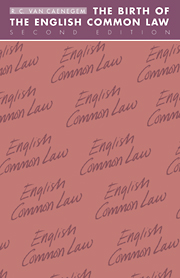Preface to the second edition
Published online by Cambridge University Press: 05 June 2012
Summary
Some authors go on working on their books even after publication: they live with them, re-read, expand and improve them with a possible new edition in mind. Others leave their work completely behind them as soon as it is out; they cannot even bring themselves to re-read it because they have moved on to other concerns and are getting bored with the book they have written, re-read and proof-read up to saturation point. I belong to this latter category but I have kept in touch with publications dealing with the early history of the common law and gladly use this opportunity to draw attention to some topics that have been discussed in that connection during the past fifteen years. This preface has also given me another chance to read the correspondence to which it led, particularly the warm letters of appreciation I received from H. Coing, G.D.G. Hall and J.R. Strayer, and I have carefully re-read the reviews which the Press regularly passed on to me and to which I will occasionally refer.
Most of the topics I have in mind can be described as traditional. One such is the moot point whether in the twelfth century the exchequer and the curia regis were two distinct institutions. In 1973 I maintained my earlier position that they were, but some scholars disagreed and either maintained that in the twelfth century the ‘barons of the exchequer’ and the ‘king's justices’ were interchangeable terms (Richardson and Sayles)
- Type
- Chapter
- Information
- The Birth of the English Common Law , pp. vii - xviPublisher: Cambridge University PressPrint publication year: 1988



